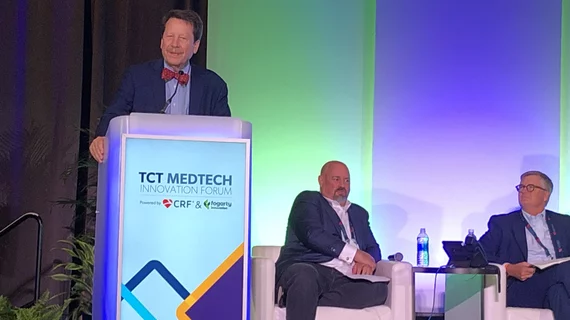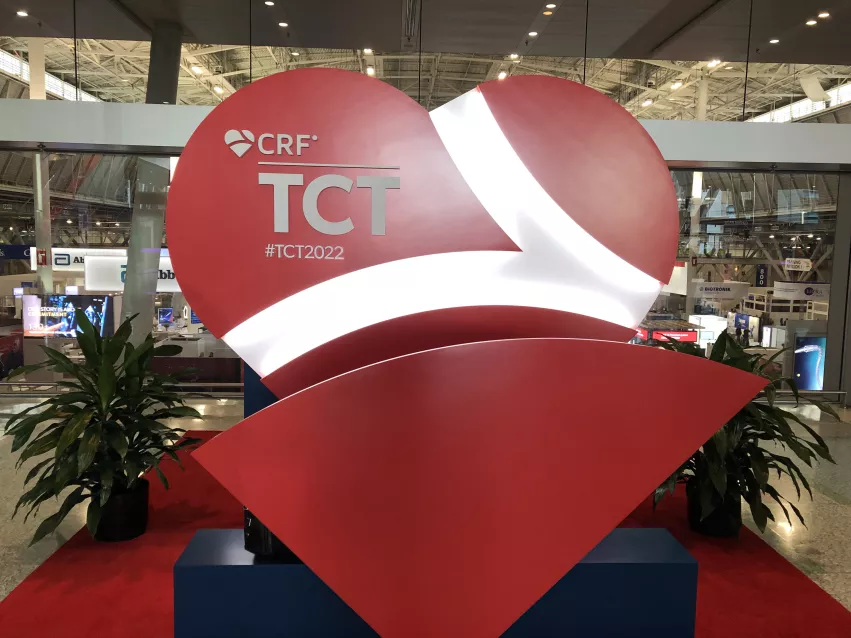FDA Commissioner Robert Califf delivers fiery speech on innovation, healthcare disparities and misinformation at TCT 2022
Robert Califf, MD, the U.S. Food and Drug Administration (FDA) commissioner, delivered a memorable keynote address at TCT 2022 in Boston in front of a packed room of cardiologists, surgeons and medical device manufacturers.
A cardiologist himself—and an adjunct professor of cardiology at the Duke University School of Medicine—Califf understands the TCT audience much more than most government representatives. Anyone expecting a traditional speech made up of nothing more than words of encouragement and inspirational quotes was likely surprised by his direct critiques of the U.S. healthcare system and his emphasis on the ways physicians need to step up and lead if things are going to ever turn around.
Room for improvement
Califf opened his speech by highlighting the creativity and innovation he sees on a regular basis from medical device specialists in the United States. He can still remember when heart attacks were treated with bed rest and a bit of morphine, he joked, and he cannot believe how far the field of cardiovascular medicine has evolved in his lifetime.
However, Califf said, there is still plenty of work to be done.
For example, he noted, while the United States spends trillions of dollars per year on healthcare, life expectancies are now considerably longer in China.
“The United States is essentially inventing the technology and then the rest of the world is figuring out how to use it better,” Califf said. “I think we need to focus on a few things that can make a difference.”
The first thing Califf said he wants U.S. specialists to focus on is demonstrating the value of what they develop and create. If the country is spending this much and still falling behind, it means too much money is going into things that do not work and not enough time is being spent on the things that do work. It is a troubling disconnect, he said, and one that needs to be corrected as soon as possible.
Califf likened it to a relay race; innovators in the United States are starting off with a bang and leading the pack, but when they drop the baton instead of just handing it off to CMS for that next lap.
“We don’t have a system that generates a continuous stream of evidence, so we can’t figure out what the actual value is of these technologies that we are inventing,” he said.
Disparities in care
Califf’s next target was the continued presence of inequity and healthcare disparities throughout the United States.
“We have a great talent for making things that benefit people who are highly educated and wealthy, but we’re not very good at developing technology that is good for the underserved,” he said.
Califf noted that disparities among different races and ethnicities continue to be a huge problem that need to be addressed, but he also highlighted the growing gap between patients who live in larger cities and those who live in more rural parts of the country. For example, he said, the TCT 2022 host city of Boston appears to be thriving in just about every way imaginable. Drive a few counties away, however, and it’s a very different story; even the life expectancies are significantly shorter. He also noted that an elderly patient with severe aortic stenosis who needs a new heart valve is much more likely to receive that valve if they live in a city than if they live out in the country.
“We have a major problem on our hands that we better deal with,” Califf said.
The danger of misinformation
Another key problem Califf highlighted was the rise of misinformation in the last few decades. It used to be that the FDA would make decisions and then a system was in place to communicate those decisions to hospitals, health systems, pharmacies, leaders, insurance providers and other key stakeholders. Now, however, FDA announcements are often met with faux outrage and lies that have much more to do with politics and grandstanding than the actual science behind the decision. This makes it hard for the average patient to separate the truth from the lies, he said, and it often results in patients not receiving the care they need.
When the first COVID-19 vaccines were released, for instance, Califf said there is “no doubt” that misinformation was being spread to purposefully keep people from being vaccinated. He said this likely cost many people their lives.
“I can’t really prove it, but I really believe misinformation is the leading cause of death in the United States today,” he said.
And how can this issue be addressed? Califf looked up at the room full of attendees and asked for their help, saying the medical device community has a crucial role to play.
“The government can’t fix this problem,” he said. “There is too much mistrust already. We need all of you to take this problem seriously, stay involved in your communities and make sure the truth is communicated to people in a way that they understand.”
After the keynote address, during a discussion on stage with other industry leaders, the topic of misinformation came up again. Replying to another panelist, Califf highlighted how difficult it has been for the government to fight back against this challenge.
"As FDA commissioner, pretty much every single phone call I make gets returned, and I've talked to a lot of people about this problem of misinformation," he said. "Nobody has a solution yet."
TCT’s MedTech Innovation Forum
Califf’s speech came at the end of TCT 2022’s MedTech Innovation Forum, an all-day event focused on sharing new ideas, networking and examining the future of healthcare. Industry leaders, entrepreneurs, investors and academics all shared their perspectives throughout the day, providing insights into the trends they are seeing today and the ones they expect to see tomorrow. This was the first year TCT has hosted the MedTech Innovation Forum.


